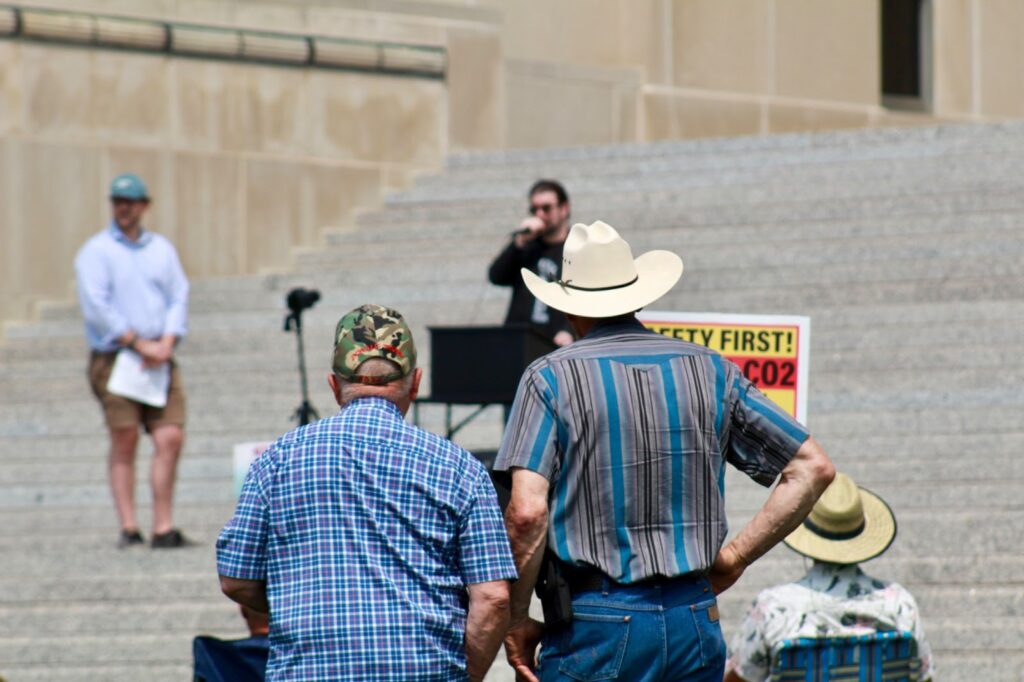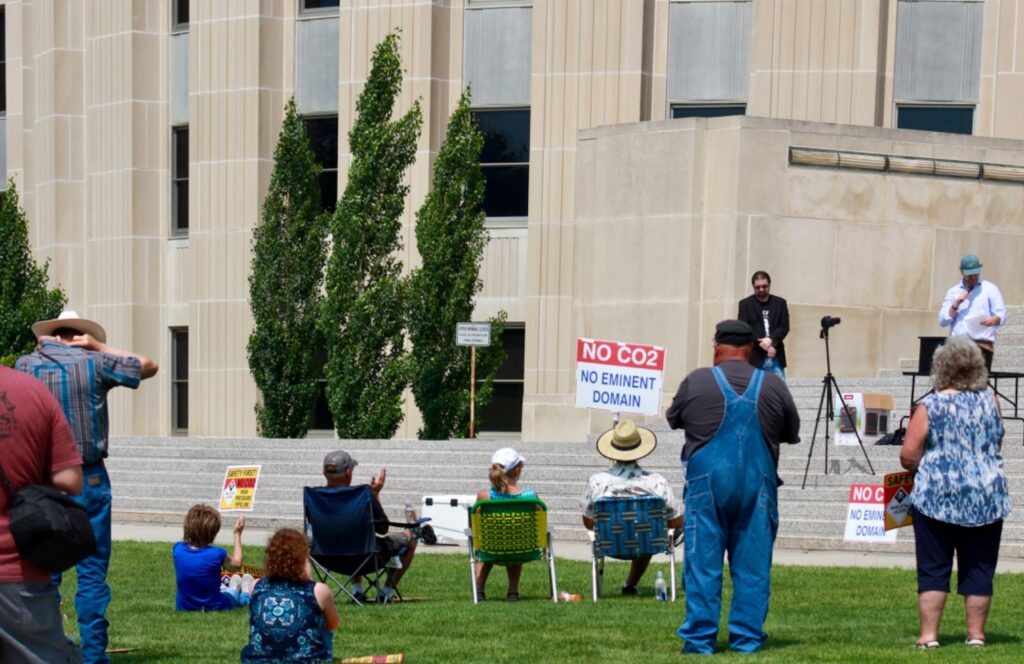North Dakotans call on state to deny permits for carbon capture project
‘We have to live here in harmony’

Tracey L. Wilkie, member of the Turtle Mountain Band of Chippewa, calls for North Dakota to focus on wind and solar sources of renewable energy. (Photo credit/ Grace Fiori)
Many North Dakotans are concerned about the safety and environmental impact of a carbon capture proposal put forth by Summit Carbon Solutions. Local land stewards recently gathered at the state capitol, calling on regulators to deny permits for 353 miles of pipeline and four storage sites outside of Bismarck.
“I was raised to be a good neighbor, a good relative, to take care of the land and the water,” said Tracey L. Wilkie, a citizen of the Turtle Mountain Band of Chippewa. She spoke from the steps of the state capitol, addressing more than 30 community members gathered on July 27.
“North Dakota, in my opinion, is being used as an environmental sacrifice zone,” Wilkie told Buffalo’s Fire. She and other residents said public education on how the project will impact human health and farmland are insufficient. They expressed concerns that neither Summit nor regulators have adequately provided plans to handle leaks and ruptures.
Iowa-based Summit Carbon Solutions hopes that the Midwest Carbon Express pipeline will be operational by 2026. The line would funnel carbon dioxide emissions 2,000-miles — from 57 ethanol plants and industrial facilities throughout Iowa, Nebraska, South Dakota and Minnesota – to underground pore spaces near Bismarck. Tharaldson Ethanol is the only North Dakota plant the line would serve.
For its role in removing greenhouse gas emissions, the project could receive millions in tax relief. These annual subsidies derive from the 2022 Inflation Reduction Act’s expansion of the carbon capture credit program.
In early 2024, Summit altered the pipeline’s proposed route to distance it from the population center of Bismarck. Now, the pipeline would direct carbon dioxide to facilities in Mercer and Oliver counties capable of depositing CO2 underground. The Public Service Commission regulates pipeline routes. The Industrial Commission approved permits for underground storage space.
Emmons County landowner Dave Moch expressed concern over the state’s emergency response system preparedness for a crisis, referencing the 2020 ruptured carbon dioxide pipeline in Mississippi.
“North Dakota, in my opinion, is being used as an environmental sacrifice zone.”
Tracey L. Wilkie, citizen of the Turtle Mountain Band of Chippewa
Karisa Grothie, who lives in nearby Baldwin, acknowledged that it’s normal to be fearful of the unknown. But, she emphasized residents’ “real concerns” about the pipeline and storage infrastructure remain largely unanswered by Summit. “They are not sharing the risks,” Grothie said.
Residents questioned how, specifically, the pipeline would be designed to endure the freeze cycles of a North Dakota winter and the erosion patterns of the prairie grasslands it will run through.
Last August, the Public Service Commission denied a permit request from Summit because the company did not adequately demonstrate how their project would minimize impacts to the environment and residents’ wellbeing.
In the summer of 2023, the U.S. Geological Survey identified 14 risk areas of geological instability within the project’s scope. A cultural resource report did not “properly address concerns” of the North Dakota State Historical Preservation Office. The report remains sealed to the public.
State law suggests that if 60% of landowners consent to the storage system, Summit can forcibly use the pore space of those refusing, by compensating them. Presently, the company has access to 90% of the storage space.

This process, known as amalgamation, is similar to eminent domain, wherein private property is acquired for necessary public use. A judge’s ruling on the public nature of private enterprise use has yet to be announced.
On July 27, Dustin Monke, an investigative journalist based in western North Dakota, encouraged residents to look ahead to the state’s next legislative session. Ask your representatives to define public use, utility services and eminent domain, he said.
The threat of amalgamation has enfolded staunch property rights advocates in a growing, unique coalition. It includes Indigenous advocates, environmental activists, farmers and ranchers speaking out against the proposed pipeline throughout all five states.
“I stand in solidarity with them and their protections,” Wilkie said. “Growing up on the reservation and all our history, I know what it’s like to have our protections overlooked and diminished. Now the system is rearing its ugly head on everybody.”
She suggested North Dakota prioritize expanding the state’s wind and solar energy capacity.

Summit’s website states that the greenhouse gas emissions would be permanently sequestered. Clean energy enthusiasts want the company to confirm the CO2 will never be used for enhanced oil recovery at a later date.
Carol Lee Carruth, a second-generation farmer in Ellendale, remains concerned about the safety of her family and the viability of her fields after Summit representatives asked her for a pipeline easement.
She noted that the landowner-advocate role is demanding. “We all have businesses we need to run, farms we need to run. How many days off can you take to come do this?” she asked.
“We’re fighting a company…and that’s their day job,” Carruth said, “versus we’re taking time away from our day job and time with our families.”
Bismarck resident Terry Pearson noted his urban neighbors have yet to join forces with the landowners immediately affected. “People are working and they’re too busy to get involved unless it affects them directly,” explained Pearson. “Until you start hurting you’re not going to get involved.”
“I believe we are living in prophetic times and now is our time to stand up and say, ‘No more!’” Wilkie said. “We have to live here in harmony.”
Grace Fiori
Former
© Buffalo's Fire. All rights reserved.
This article is not included in our Story Share & Care selection.The content may only be reproduced with permission from the Indigenous Media Freedom Alliance. Please see our content sharing guidelines.
The tree features names of missing Indigenous people
The monumental Gila River Indian Community Water Rights Settlement celebrates its 21st anniversary
Inspired by her grandparents, Tonah Fishinghawk-Chavez proves that caring for the community is an action, not just a word
The billboard project is expanding to Oregon
Identification not yet made







